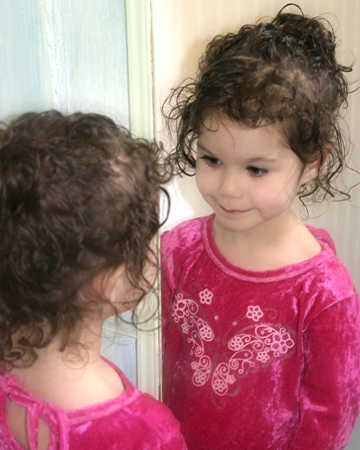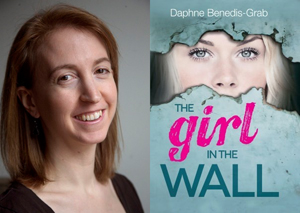
More than just a Pretty face
Of course, we want our daughters to take pride in their looks, but also in all their other amazing attributes. With so much pressure from the media and society about girls looking beautiful, parents need to put the focus back on the things that really matter.
Contributed by Daphne Benedis-Grab
My daughter is beautiful. I can say that without sounding conceited because she is also adopted. I have nothing to do with the glossy black hair, bright brown eyes and delicate features that make her such a pretty girl — that credit goes to her birth parents. But what it means for me is that as she gets older I have to help her navigate what it means to be a beautiful girl.
When my kids were little everyone called them cute. And cute they were, running about in Pampers-covered bottoms delighting in each new discovery, their faces suffused with joy at the world around them . But then they got older and suddenly people were using new words to describe them.
A slippery slope
Now at 8 my son is called big and strong, a good artist, a fast runner, highly imaginative, smart, a good friend. And my daughter, who is also 8?
She's called beautiful. Pretty much all the time. My son is big and strong and all the other things on that list, as well as other things that may go by unnoticed. And it's OK if few people tell him that he is sweet with animals or a good listener because he hears enough to know that he has various traits and abilities that other people recognize and value. But my daughter? All she seems to get is pretty. And that is a slippery slope indeed, because the future holds a lot of false messages about beauty, its importance and what it truly is.
Photoshopped women smile out at us from magazine covers and billboards. TV shows and movies present only the most perfect and perfectly coifed versions of what it means to be a girl or woman. Everywhere she looks my daughter will see that a very specific, unattainable beauty is something she should be striving for. And I don't think it's overstating to say that I believe that to be a death trap.
More than just pretty
Of course I want my daughter to feel good about how she looks and to take pride in the clothes she chooses and the way she wears her hair. It's fun and it's also an important part of feeling good about yourself. But the key word is 'part' — it's one thing in many that she should value in herself and hear valued by others. I want her to know that in addition to being pretty she is also a hard worker, an excellent dancer, has a great sense of humor, is kind and compassionate and that she is smart. Though that one — smart — is another slippery slope.
Like most things that come up with my kids, the roots of my feeling about what they are dealing with goes back to my own childhood experiences. My daughter comes home with a story of how a girl told her she didn't want my daughter to play with their group at recess? Boom, I am back on my elementary school playground hearing Alison Brown tell me none of the girls in the group like me anymore. It makes it hard to react as the rational adult I at least attempt to portray in my parenting life. And the smart thing? That pulls me back as well, to the day in middle school when my mother told me that my sister was beautiful. "What about me?" I asked. "Well, you're nice looking," she said. "And you're very smart." My sister got the reverse message and I can tell you some bitterness lingers on both sides.
What does this mean for me now, when I am in rational adult mode? It means I understand how dangerous it is to believe that your identity is wrapped up in being one thing. I got over-invested in being smart, just as my sister got over-invested in being beautiful. And I want so much more than that for my daughter. I want her to know she is all kinds of things, that she has all kinds of strengths, and that she has flaws and shortcomings and places where she will need to work hard, like we all do. I don't want her to think that pretty is the beginning and end of who she is. I don't want her to be so limited and so invested in something that has her forever vulnerable to the judgment of others.
Making a list
One morning last week we got in the elevator and my daughter looked in the mirror and announced in a defeated voice, "I look ugly." The remark made my heart twist but I was able to calmly point out that the sickly yellow lighting of the elevator turned us all into ghouls and she immediately saw the truth in that and was able to move on. But later that day we had the first of what I suspect will be many beauty talks over the years. I didn't want to lay it on too thick so I started by telling her how great it was that she got joy from selecting her clothes and hairstyles, and that looking nice mattered to her.
"You are pretty," I told her. "But you are so many other things too, things that matter just as much as being pretty. Can you think of what some of them are?" The first word she said was strong, which made my heart sing. And then she listed several more, putting thought into it, thinking about what she loves, all the pieces that make her the person she is. It was a good list with a lot of things on it, which is as it should be.
I'm not sure how much difference one conversation makes when there is so much in our society that tells her her value begins and ends with her looks. But I think it's a beginning, and hopefully some kind of base that can anchor her back when the images of beauty threaten to engulf her self-esteem and sense of identity.
Hopeful — that is a good one to add to anyone's list.
![Daphne Benedis-Grab - The Girl in the Wall]() About the author
About the author
Daphne Benedis-Grab, author of The Girl in the Wall, earned her MFA in creative writing from The New School, where she began the thesis that became her first book, Alive and Well in Prague, New York. She has worked a number of jobs including building houses for Habitat for Humanity and teaching adult literacy classes. She lives with her husband and their two children in New York City.
For more information please visit daphnebg.com and adamsmedia.com, and follow Benedis-Grab on Facebook and Twitter.
 About the author
About the author